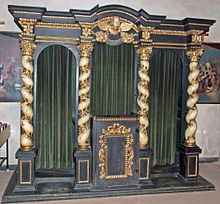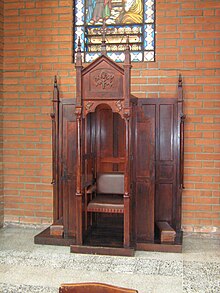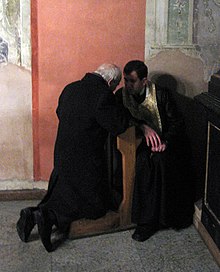Confession
From Wikipedia, the free encyclopedia
| This article or section uncritically uses the texts and opinions from within a religion, without referring to primary or secondary sources that critically analyse them. Please help improve this article by adding details from reliable primary and secondary sources. Please see the relevant discussion on the talk page. |
| This article needs additional citations for verification. Please help improve this article by adding reliable references. Unsourced material may be challenged and removed. (October 2009) |


The confession of one's sins is a religious practice important to many faiths, e.g., Roman Catholicism and Eastern Orthodoxy.
Contents[hide] |
[edit] Christianity
In many Christian faiths and practices, confession is similar to a criminal confession -- an admission of one's guilt.[citation needed] The practice is conducted between a confessor and a priest, sometimes within a confessional box or booth. Confession of one's sins, or at least of one's sinfulness, is seen by most churches as a pre-requisite for becoming a Christian. The advice given by the minister to the penitent, however, is not the same as pastoral counseling, as confession has as its specific purpose the forgiveness of sins.
[edit] Confession of sins
[edit] Catholicism

In Catholic teaching, the Sacrament of Penance is the method used by the Church by which individual men and women may confess sins committed after baptism and have them absolved by a priest. This sacrament is known by many names, including penance, reconciliation and confession (Catechism of the Catholic Church, Sections 1423-1442). While official Church publications always refer to the sacrament as "Penance", "Reconciliation" or "Penance and Reconciliation", many laypeople continue to use the term "confession" in reference to the sacrament.
The intent of this sacrament is to provide healing for the soul as well as to regain the grace of God, lost by sin. Catholics believe that priests have been given the authority by Jesus to exercise the forgiveness of sins here on earth and it is in Jesus' Holy Name by which the person confessing is forgiven. The Council of Trent (Session Fourteen, Chapter I) quoted John 20:22-23 as the primary Scriptural proof for the doctrine concerning this sacrament, but Catholics also consider Matthew 9:2-8, 1 Corinthians 11:27, and Matthew 16:17-20 to be among the Scriptural bases for the sacrament.
The basic form of confession has not changed for centuries, although at one time confessions were made publicly.[1] In theological terms, the priest acts in persona Christi and receives from the Church the power of jurisdiction over the penitent. Typically the penitent begins the confession by saying, "Bless me Father, for I have sinned. It has been [time period] since my last confession." The penitent then must confess mortal sins in order to restore his/her connection to God's grace and not to merit Hell. The sinner may also confess venial sins; this is especially recommended if the penitent has no mortal sins to confess.
[edit] Eastern Orthodoxy and Eastern Catholicism
Within the Eastern Orthodox and Eastern Catholic churches, it is understood that the Mystery of confession and repentance has more to do with the spiritual development of the individual and much less to do with purification. Sin is not seen as a stain on the soul, but rather a mistake that needs correction.

In general, the Orthodox Christian chooses an individual to trust as his or her spiritual guide. In most cases this is the parish priest, but may be a starets (Elder, a monastic who is well-known for his or her advancement in the spiritual life) or any individual, male or female, who has received permission from a bishop to hear confession. This person is often referred to as one's "spiritual father" or "spiritual mother". Once chosen, the individual turns to his spiritual guide for advice on his or her spiritual development, confessing sins, and asking advice. Orthodox Christians tend to confess only to this individual and the closeness created by this bond makes the spiritual guide the most qualified in dealing with the person, so much so that no one can override what a spiritual guide tells his or her charges. What is confessed to one's spiritual guide is protected by the same seal as would be any priest hearing a confession. While one does not have to be a priest to hear confession, only an ordained priest may pronounce the absolution.
Confession does not take place in a confessional, but normally in the main part of the church itself, usually before an analogion (lectern) set up near the iconostasion. On the analogion is placed a Gospel Book and a blessing cross. The confession often takes place before an icon of Jesus Christ. Orthodox understand that the confession is not made to the priest, but to Christ, and the priest stands only as witness and guide. Before confessing, the penitent venerates the Gospel Book and cross, and places the thumb and first two fingers of his right hand on the feet of Christ as he is depicted on the cross. The confessor will often read an admonition warning the penitent to make a full confession, holding nothing back.
In cases of emergency, of course, confession may be heard anywhere. For this reason, especially in the Russian Orthodox Church, the pectoral cross that the priest wears at all times will often have the Icon of Christ "Not Made by Hands" inscribed on it.
In general practice, after one confesses to one's spiritual guide, the parish priest (who may or may not have heard the confession) covers the head of the person with his Epitrachelion (Stole) and reads the Prayer of Absolution, asking God to forgive the transgression of the individual (the specific prayer differs between Greek and Slavic use). It is not uncommon for a person to confesses his sins to his spiritual guide on a regular basis but only seek out the priest to read the prayer before receiving Holy Communion.

In the Eastern Churches, clergy often make their confession in the sanctuary. A bishop, priest, or deacon will confess at the Holy Table (Altar) where the Gospel Book and blessing cross are normally kept. He confesses in the same manner as a layman, except that when a priest hears a bishop's confession, the priest kneels.
Orthodox Christians should go to confession at least four times a year; often during one of the four fasting periods (Great Lent, Nativity Fast, Apostles' Fast and Dormition Fast). Many pastors encourage frequent confession and communion. In some of the monasteries on Mount Athos, the monks will confess their sins daily.
Orthodox Christians will also practice a form of general confession, referred to as the rite of "Mutual Forgiveness". The rite involves an exchange between the priest and the congregation (or, in monasteries, between the superior and the brotherhood). The priest will make a prostration before all and ask their forgiveness for sins committed in act, word, deed, and thought. Those present ask that God may forgive him, and then they in turn all prostrate themselves and ask the priest's forgiveness. The priest then pronounces a blessing. The rite of Mutual Forgiveness does not replace the Mystery of Confession and Absolution, but is for the purpose of maintaining Christian charity and a humble and contrite spirit. This general confession is practiced in monasteries at the first service on arising (the Midnight Office) and the last service before retiring to sleep (Compline). Old Believers will perform the rite regularly before the beginning of the Divine Liturgy. The best-known asking of mutual forgiveness occurs at Vespers on the Sunday of Forgiveness, and it is with this act that Great Lent begins.
[edit] Anglicanism
The Anglican sacrament of confession and absolution is usually a component part of corporate worship, particularly at services of the Holy Eucharist. The form involves an exhortation to repentance by the priest, a period of silent prayer during which believers may inwardly confess their sins, a form of general confession said together by all present, and the pronouncement of absolution by the priest, often accompanied by the sign of the cross.
Private or auricular confession is also practiced by Anglicans and is especially common among Anglo-Catholics. The venue for confessions is either in the traditional confessional, which is the common practice among Anglo-Catholics, or in a private meeting with the priest. This practice permits a period of counseling and suggestions of acts of penance. Following the confession of sins and the assignment of penance, the priest makes the pronouncement of absolution. The seal of the confessional, as with Roman Catholicism, is absolute and any confessor who divulges information revealed in confession is subject to deposition and removal from office.
Historically, the practice of auricular confession was originally a highly controversial one within Anglicanism. When priests began to hear confessions, they responded to criticisms by pointing to the fact that such is explicitly sanctioned in The Order for the Visitation of the Sick in the Book of Common Prayer, which contains the following direction:
Here shall the sick person be moved to make a special Confession of his sins, if he feel his conscience troubled with any weighty matter. After which Confession, the Priest shall absolve him (if he humbly and heartily desire it)
Auricular confession within mainstream Anglicanism became accepted in the second half of the 20th century; the 1979 Book of Common Prayer for the Episcopal Church in the USA provides two forms for it in the section "The Reconciliation of a Penitent." Private confession is also envisaged by the Canon Law of the Church of England, which contains the following, intended to safeguard the Seal of the Confessional:
if any man confess his secret and hidden sins to the minister, for the unburdening of his conscience, and to receive spiritual consolation and ease of mind from him; we...do straitly charge and admonish him, that he does not at any time reveal and make known to any person whatsoever any crime or offence so committed to his trust and secrecy[2]
There is no requirement for private confession, but a common understanding that it may be desirable depending on individual circumstances. An Anglican aphorism regarding the practice is "All may; none must; some should".[3]
[edit] Protestantism
Most Protestant churches believe that no intermediary except Christ is necessary between the Christian and God in order to be absolved from sins (The Catholic Church does not view the priest as an intermediary either). Protestants, however, confess their sins in private prayer before God, believing this suffices to gain God's pardon. However confession to another is often encouraged and in some sects or denominations required when a wrong has been done to a person as well as to God. Confession is then made to the person wronged and also to God, and is part of the reconciliation process. In cases where sin has resulted in the exclusion of a person from church membership due to unrepentance, public confession is often a pre-requisite to readmission. The sinner confesses to the church his or her repentance and is received back into fellowship. In both cases there is a required manner to the confessions: for sins between God and Man and for sins between Man and Man.
[edit] Lutheranism
Lutherans differ from other Protestants, as they practice "confession and absolution". They, like Roman Catholics, see James 5:16 and John 20:22-23 as biblical evidence for confession.[4] Confession and absolution is done private to the pastor, called the "confessor" with the person confessing known as the "penitent". In private confession (also known as Holy Absolution), the penitent makes an act of contrition, as the pastor, acting in persona Christi, announces this following formula of absolution (or similar): "In the stead and by the command of my Lord Jesus Christ, I forgive you all your sins in the name of the Father and of the Son and of the Holy Spirit."[5] Lutherans reject the teaching that forgiveness is obtained through penance.[6] In the Lutheran Church, like the Roman Catholic Church, the pastor is bound by the Seal of the Confessional. Luther's Small Catechism says "the pastor is pledged not to tell anyone else of sins to him in private confession, for those sins have been removed.[4] If the Seal is broken, it will result in excommunication.[4]
[edit] Mormonism
The Church of Jesus Christ of Latter-day Saints teaches that "Confession is a necessary requirement for complete forgiveness." The sinner must confess both to those persons wronged by his sin and to God. Confession may also be required to an authorized Priesthood leader: "Those transgressions requiring confession to a bishop are adultery, fornication, other sexual transgressions and deviancies, and sins of a comparable seriousness." The priesthood leader has authority to forgive the sinner on behalf of the Church, or he may counsel the sinner to submit to the authority of a disciplinary council. However, the confession must be held in strict confidence unless the sinner grants permission to disclose it to the disciplinary council.[7]
[edit] Buddhism
In Buddhism, confessing one's faults to a superior is an important part of Buddhist practice. In the various sutras, followers of the Buddha confessed their wrongdoing to the Buddha.[8] Other sections of the earliest Buddhist writings (ie, the Vinaya) required that monks confess their individual sins before their bi-weekly convening for the recitation of the Patimokkha .
[edit] Islam
In Islam, confession, or declaration to be more precise, of faith is one of the five pillars of Islam (see Shahadah). The act of seeking forgiveness from God is called Istighfar. Like Judaism, confession of sins is made directly to God and not through man (except in asking for forgiveness of the victim of the sin).
[edit] Judaism
In Judaism, confession is an important part of attaining forgiveness for both sins against God and another man. Confessions to God are done communally in the plural. Jews confess that "We have sinned." In matters involving offenses against a fellow man, private confession to the victim is a requirement to obtaining forgiveness from the victim, which is generally a requirement to obtaining forgiveness from God. If the victim refuses to forgive, the offender confesses publicly, before larger and larger audience. Confession (viduy) is also performed on one's deathbed, if at all possible.



Inga kommentarer:
Skicka en kommentar